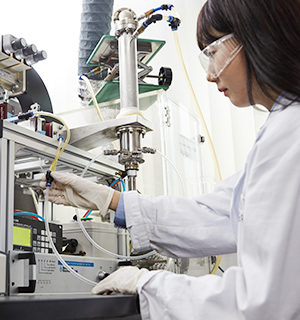
The Department of Electronic Materials Engineering produces skilled engineers equipped with creativity and extensive knowledge in electronics devices and materials including semiconductor. The curriculum consists of basic courses on electromagnetics, electronic physics and circuit theory as well as major courses on semiconductor process, electronic circuit and magnetic materials. The Department conducts research in silicon semiconductor, compound semiconductor, semiconductor devices, dielectric materials and devices, memory and electronics, integrated circuit design and experiments.
Location : Rm.424-1, Bima Hall
Tel : 82-940-5160
e-mail : tsuyo0410@kw.ac.kr
Website : http://snme.kw.ac.kr/
Course Descriptions
Basic Circuit Lab and Design 1,2
This course covers the basics of electronic engineering, including the usage of various types of measurement equipment and linkage of basic circuits, by conducting fundamental experiments. In addition, measurement experiments regarding various electronic device such as diode, transistor, FET etc will be conducted in order to understand the principles of basic electronic engineering.
Physical Electronics 1,2
This course will deal with the basic principles required for understanding the physical phenomenon of device used in electronic and electric circuits. Physical and electrical features of semiconductor device and the physical properties of electrons within metal and semiconductors will be examined, as a basis of electronic, electrical engineering.
Electromagnetism 1,2
This course deals with vectorizing and mathematizating the basic principles of electromagnetism and understanding them from a macroscopic perspective. Main areas of study include electric field in vacuum, electric and magnetic fields within magnetic medium, boundary condition, electromagnetic induction, and Maxwell equation, based on the basic phenomenon of electricity and magnetism.
Circuit Theory 1,2
This course deals with the basic concept of circuits, fundamental wave form, basic circuit, solution of circuit equation, signal interpretation of electric circuits etc. Main areas of study include direct currents, alternate current circuits, complex number circuit interpretation, inductive coupling circuits, Laplace transformation, Fourier transformation, and equation of state, based on Circuit Theory(Ⅰ).
Digital Logic Circuit 1,2
This course deals with the basics for the design of logic circuits and mainly covers the number system and encoding, logic theory, logic circuit minimization method, memory device, input-output system etc. Main areas of study include all the matters related to sequential logic circuit design, as well as flip-flop features, sequential circuit structures, usage and applications of sequential logic circuits.
Electronic Materials Lab and Design 1,2
This course deals with experiments on the electric features of metal, wire material, resistance material, contact point material, and the basic characteristics of thermocouple material, insulation material, magnetic material, and semiconductor material.
Solid Physics 1,2
This course deals with the theory of crystal structure, crystal diffraction, crystal deficiency, Phonon and lattice vibration, thermal properties of insulators, Fermi gas, energy band, semiconductor crystal, superconductivity, ferromagnetism, paramagnetism, and diamagnetism. This course aims to perfectly understand the property of matter and outline of materials, based on Solid Physics(Ⅰ).
Semi Conductor Device Physics 1,2
This course covers the Energy Band theory within semiconductors, Diffusion and Scattering process, Charge Transport, Quantum Effect and Interface phenomenon. Studies on semiconductor device theory will also be conducted, in relation to the movement of current semiconductors and development of new semiconductor device. In addition, this lecture will also cover pn joint diode, M-S joint diode, viola transistor, MOSFET, and JFET etc.
Electronic Circuit 1,2
This course covers various circuits including rectifiers, amplifier circuits and filters, which use electronic device such as diode, transistor, and operational amplifiers, with the aims to enhance designing ability of electronic circuits, and analyzing skills in regard to the movement circuits which use semiconductor electronic device.
Optical Properties 1,2
This course aims to understand Geometrical Optics and Paraxial Optics(Metrix Method) as primary approach of optical science, as well as Aberration theory and Optical Instrumentation. It will also cover Holography, the application of basic reiteration and interference phenomenon which will also be studied, based on the quantitative and qualitative examination and induction of Wave Equation. Special emphasis will be given to the property of optical science and its applications, especially optical applications using laser, based on Optical Properties (Ⅰ).
Vacuum Engineering 1,2
This course will deal with the concept of vacuum, units, nature of gas, and the movement principles and structure of the vacuum system, vacuum pump, and vacuum gauge, as well as the application of the electronic material production process.
Thermodynamics 1,2
This course studies how to combine various materials and form a required feature, based on the understanding of basic principles in thermodynamics.
Capstone Design 1,2
Tasks of this course will be managed in teams or as individuals. All the matters related to the task including its theme, range, and schedule will be decided independently. The evaluation points will include the task's relation to the major, the level of difficulty, division of roles etc, and diligence and teamwork will also be assessed.
Electronic Material Production Lab and Design 1,2
This course allows students to experience the research being conducted by the department's professors, and provides the opportunity to produce device related to the subject according to each lab, as well as investigate the features of semiconductors, new material and experiment their production process.
Semiconductor Production Technology
This course covers the basic skills used in the production of semiconductor device. Main subjects include the principles and technologies of lithography, oxidation, diffusion, and ion implantation etc.
Analysis Equipment Usage
This course deals with the principles and instructions of various equipment which analyze the features of electronic material. The equipment include SEM, TEM, X-ray, AES, XPS, SIMS etc.
Photoelectronic Engineering
This course covers photon-material interaction, photoluminescence(cathode, electric field), light emitting diode, plasma device, and the occurrence and features of laser.
Ceramics
This course deals with the basic features, production and application of high-tech ceramics.
Display Engineering
This course covers the structure and movement principle of all types of display device such as TFT-LCD, OLED, PDP, and LED etc.